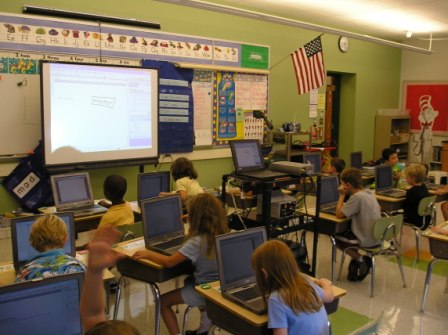
A techy first-grade classroom. Photo from web.
If you find yourself needing both your shoelaces double-knotted in less than ten seconds, I’m your girl. If you need to learn geometry in Spanish, give me a call. If you need a good laugh, come spend a day with me and I guarantee you’ll walk away with some material for a standup comedy routine.
I am not your typical college senior. I am a student teacher in a bilingual second grade class. I have twenty-one little darlings who demand my undying love, attention and guidance for seven hours a day from Monday to Friday. As you can only imagine, there is never a dull moment when you have a class full of seven-year-olds.
The kids never cease to amaze me with what they are capable of. However, just when I find myself impressed and inspired by their abilities and depth of understanding, they will say or do something so completely off-base and hilarious that it requires every ounce of self-control to maintain a straight face. On multiple occasions, I have been presented with wildly inappropriate demonstrations of their phonetic awareness, of which they are actually completely unaware. One girl was trying to sound out horse, and kept repeating the first syllable very loudly, over and over again (hor, hor, hor-s). When I asked where you could find a liquid, one boy proudly wrote “hoes” in bold letters. My all-time favorite, however, was when a student was supposed to write “I counted pennies.” Instead, I found myself with a paper that read “I cunted penis.”
One day, after I read a book that challenged the common belief that Columbus discovered America, students were debating issues of power and questioning why the Europeans thought that they could show up and take land from the native people. The thoughtfulness and passion that the students had about the issue was amazing. Afterwards, though, I felt a tap on my leg and turned to find a pensive and thoughtful boy looking extremely confused. “But Miss Rachel! Where do people come from in the first place?!” he asked me. Shocked and stuttering, I carefully chose my words and asked him to clarify what he meant. “I mean, there are little people and they are like kids.” he continued, “But then they grow up into big people and they are grownups. But how do the kids get here in the first place?” Still not wanting to say anything wrong, I asked him to clarify one more time. “Do you mean, where do babies come from?” I asked him. “YES!” he exclaimed, exasperated. I told him to go ask mom. So much for that lesson.
The kids can tell you how to write descriptively using their senses, how to say “peace” in fifteen languages (Danish, Russian and Tibetan to name a few), and even had the maturity not to laugh when we learned that fiber makes you poop. However, when I look back on these past few months, what’s a lot more impressive is what these kids have taught me.
The biggest demonstration of this came when we were doing a unit on peace. It made me think that we should just let children solve the world’s problems, because their solutions are so much simpler and more logical. For our culminating project, the kids all wrote about what peace means to them and how they can make peace in the world.
Show and tell people that you love them. Learn new languages. Take care of your environment. Take care of each other. Help your friends. Share – especially your smiles and laughter. Say you’re sorry and mean it. If somebody apologizes you should forgive and forget. Hold somebody’s hand. Hugs are really important, too.
It’s important to note that these ideas are coming from a very demographically diverse group of children. Eleven of my students speak Spanish at home, while ten speak English with their families. One student has Asperger Syndrome, one is autistic, and one is highly medicated for ADD. We suspect that one of our students is bipolar. One little boy has a serious growth issue which means he will die at a young age. Some of the students are upper-middle class from nearby suburban towns, while others live in housing developments in New London.
And yet, everybody is friends. If you watch the children at recess you will not notice any divides among the students. The students don’t group themselves based on socioeconomic status, gender, race, or developmental abilities. And every Monday morning during our bilingual sing, I look out into a sea of faces singing “queremos paz, y libertad en este mundo” (we want peace and liberty in this world) and I really do believe it. So even though I may come back to campus at the end of the day completely drained physically, mentally and emotionally, I wouldn’t trade this experience for anything. It recently dawned on me that while I have been busy trying to teach these kids all about life, they have been teaching me what life is really all about. •









